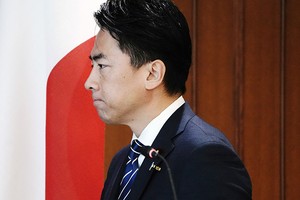March 9, 2023 at 12:51 JST
 Sanae Takaichi, state minister in charge of economic security, speaks during an Upper House plenary session on March 8. (The Asahi Shimbun)
Sanae Takaichi, state minister in charge of economic security, speaks during an Upper House plenary session on March 8. (The Asahi Shimbun)
The telecommunications ministry on March 7 confirmed the authenticity of internal documents that show a close aide to former Prime Minister Shinzo Abe pressured the ministry to effectively change the interpretation of a provision of the Broadcasting Law.
Since the law, which requires broadcasters to be politically fair and neutral in creating and editing programs, was enacted in 1950, the government has maintained that judgment on whether a broadcaster complies with this provision should be based on its programs as a whole.
It now seems likely that this policy has been changed significantly through closed-door discussions involving certain politicians and bureaucrats.
This matter has raised serious questions about possible political intervention in the media and the legitimacy of the policymaking process. The government says it has yet to confirm the factuality of all the records in the documents.
The accuracy of the documents should be swiftly determined.
But one minister is hampering this crucial task by calling the documents, which were disclosed by an opposition lawmaker, as a “fabrication.” It is none other than Sanae Takaichi, who made remarks referring to the policy change at the Diet when she headed the ministry.
Even after the ministry officially recognized that they are “administrative documents,” or official records, Takaichi has repeatedly insisted that they are fabricated, saying daily in the Diet that they describe things that did not occur and are not fact-based.
Referring to the records of a meeting that the documents say she attended, Takaichi, for example, has claimed that the meeting did not take place. When asked why the bureaucrats who produced the documents had fabricated them, Takaichi went so far as to say, “I guess they needed (records of job) performances.”
This is a reckless remark that damages the public trust in administration and shakes the democratic foundation of the state.
To be fair, the documents were made by bureaucrats at the ministry and the descriptions they contain were not confirmed in advance by the people involved. It should be noted that they were written from the viewpoints of bureaucrats.
But official documents are produced to make accurate records of the process of policymaking and implementation for future examinations as a means for the government to fulfill its responsibility to explain policy decisions and actions to the public, now and in the future.
Producing such documents is one of the core tasks of bureaucrats.
A politician who overbearingly calls such documents “fabrication” inevitably undermines the credibility of all such records. Obviously, Takaichi should offer more detailed and convincing explanations about her claims.
Moreover, it was Takaichi herself who led the ministry when the documents were made. Does she realize that she would be held responsible if the documents prove to be as inaccurate as she says?
She should stop eroding the credibility of the official documentation system without giving any solid basis for her claims.
Securing proper and reliable management of official documents is an important policy challenge for the entire government.
With a person who keeps making such outrageous claims about official documents holding a Cabinet portfolio, it is difficult to ensure a dependable official documentation system in this nation.
--The Asahi Shimbun, March 9




















A peek through the music industry’s curtain at the producers who harnessed social media to help their idols go global.
A series based on diplomatic documents declassified by Japan’s Foreign Ministry
Here is a collection of first-hand accounts by “hibakusha” atomic bomb survivors.
Cooking experts, chefs and others involved in the field of food introduce their special recipes intertwined with their paths in life.
A series about Japanese-Americans and their memories of World War II